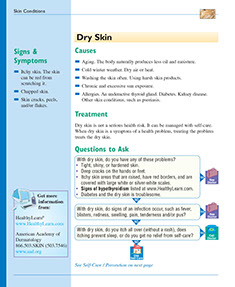CONDITIONS
SYMPTOM CHECKER
Male
Female
Child
Arm, Hand & Shoulder Concerns
Legs & Feet Concerns
Dental & Mouth Concerns
Ear & Nose
Eye Conditions
Head Conditions
Arm, Hand & Shoulder Concerns
Legs & Feet Concerns
Front
Back
Arm, Hand & Shoulder Concerns
Dental & Mouth Concerns
Ear & Nose
Eye Conditions
Head Conditions
Arm, Hand & Shoulder Concerns
Dental & Mouth Concerns
Ear & Nose
Eye Conditions
Head Conditions
Front
Back
Arm, Hand & Shoulder Concerns
Neck Links
Head & Neck Concerns
Arm, Hand & Shoulder Concerns
Neck Links
Head & Neck Concerns
Front
Back
Online Clinic
Wise Healthcare
Dry Skin
Print on Demand
RELATED ARTICLES
Signs & Symptoms
Causes
• Aging. The body naturally produces less oil and moisture.
• Cold winter weather. Dry air or heat.
• Washing the skin often. Using harsh skin products.
• Chronic and excessive sun exposure.
• Allergies. An underactive thyroid gland. Diabetes. Kidney disease. Other skin conditions, such as psoriasis.
Treatment
Resources
Questions to Ask
Question 1
With dry skin, do you have any of these problems?
• Tight, shiny, or hardened skin.
• Deep cracks on the hands or feet.
• Itchy skin that are raised, have red borders, and are covered with large white or silver-white scales.
• Signs of hypothyroidism.
• Diabetes and the dry skin is troublesome.
You should be seen by your doctor for medical advice. Contact your doctor or health care provider to find out how soon you should be seen.
Question 2
With dry skin, do signs of an infection occur, such as fever, blisters, redness, swelling, pain, tenderness and/or pus?
You should be seen by your doctor for medical advice. Contact your doctor or health care provider to find out how soon you should be seen.
Question 3
With dry skin, do you itch all over (without a rash), does itching prevent sleep, or do you get no relief from self-care?
Call your doctor or health care provider and state the problem. He or she can decide what you should do.
Use Self-Care / Prevention:
You can probably take care of the problem yourself if you answered NO to all the questions. Use the “Self-Care” measures that are listed. Call your doctor if you don’t feel better soon, though. You may have some other problem.
Self-Care / Prevention
• Drink 8 or more glasses of water a day.
• Apply an oil- based lotion daily.
• Wear rubber gloves when you wash dishes.
• Take showers instead of baths. Use warm (not hot) water. Try sponge baths.
• Apply a moisturizing cream while your skin is damp. Use products with lanolin.
• If you do bathe, do so for only 15 to 20 minutes in lukewarm water. Pat yourself dry. Do not rub.
• Put soap on a washcloth, not right on the skin.
• Use a mild liquid soap, like Cetaphil lotion or use a fatted soap. Avoid deodorant, medicated, or alkaline soaps.
• Don’t use moisturizers with fragrances, preservatives, or alcohol.
• Use a night cream for the face.
• Stay out of the strong sun. Do not use tanning salons. When in the sun, use a sunblock with a sun protection factor (SPF) of at least 15.
• Don’t scratch or rub dry skin.
This website is not meant to substitute for expert medical advice or treatment. Follow your doctor’s or health care provider’s advice if it differs from what is given in this guide.
The American Institute for Preventive Medicine (AIPM) is not responsible for the availability or content of external sites, nor does AIPM endorse them. Also, it is the responsibility of the user to examine the copyright and licensing restrictions of external pages and to secure all necessary permission.
The content on this website is proprietary. You may not modify, copy, reproduce, republish, upload, post, transmit, or distribute, in any manner, the material on the website without the written permission of AIPM.
2021 © American Institute for Preventive Medicine - All Rights Reserved. Disclaimer | www.HealthyLife.com
















































